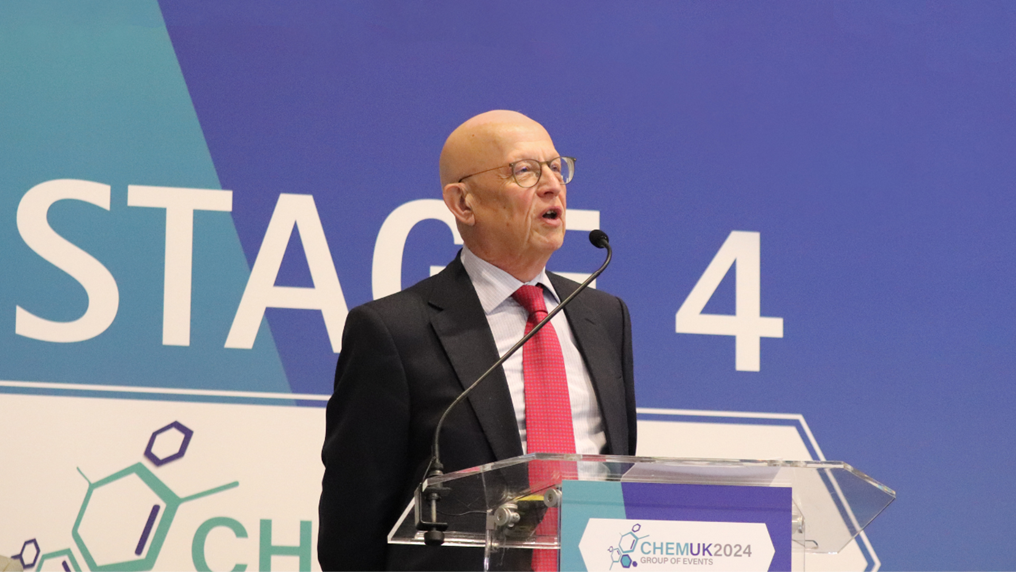STEM, scaling up and the skills gap: IChemE at CHEMUK 2024

17th May 2024
Several leading IChemE representatives attended the National Exhibition Centre, Birmingham, UK, this week as the Institution delivered a packed programme in support of CHEMUK.
The 2024 edition of the UK’s largest annual chemical, laboratory and process industries supply chain expo and speaker event was visited by delegates from the worlds of chemical and process engineering, health and safety, plant and asset maintenance and more, with appearances from more than 500 specialist exhibitors and 100 expert speakers over the course of a two-day exhibition.
Representing IChemE were President Nigel Hirst and CEO Yvonne Baker, whose respective keynote speeches ‘Net Zero: the ultimate scale-up challenge?’ and ‘Mind the Skills Gap – the case for prioritising STEM’ were well attended by guests. They were joined at the event by other members of IChemE staff, who demonstrated the benefits of IChemE membership and the advantages of achieving Chartered status to those who visited our stand.
Elsewhere, an IChemE mini conference entitled ‘Towards sustainable production: the scaling up challenge’ brought together experts from industry and academia to discuss the key issues at play in making large-scale production processes more sustainable.
The panel, chaired by IChemE Fellow Chris Hamlin, comprised Dr Andy Ingram, associate professor, chemical engineering, University of Birmingham; Rob Peeling, chair, IChemE Congress; Anna Parsons, associate director, chemical development, AstraZeneca; and Dr James Winterburn, chair, IChemE Biochemical Engineering Special Interest Group. President Nigel Hirst was on hand to offer insight into how the Institution's knowledge, resources, and commitment to change could enable chemical and process engineers to make the transition towards more sustainable practices.
Speaking at the event, the President said: “To develop the circular economy, chemical and process engineers need to apply their well-known ability to analyse systems at scales from the molecular to the global. They must work on the entire supply chain to understand the relationships between production, the usage of the stock of materials and goods already in the economy, recycling, and ‘waste’, with the journey to net zero requiring innovation and development of sustainable industrial practices.
“As part of our ongoing commitment to this vitally important topic, IChemE is continuing to provide these professionals with the tools they need to achieve these objectives, with 71 technical webinars focused on issues relating to sustainability held in the last year alone, as well as the regular publication of our Sustainable Production and Consumption journal, which currently holds an Impact Factor of 12.1.
“It is this tireless investment in sustainability that will ensure that the insight and expertise of our member community continue to impact development and encourage debate as we strive to bring about the change that helps to engineer a sustainable world.”
IChemE Head of Policy and Impact Duncan Lugton rounded off proceedings by contributing to a panel discussion on sustainable polymers in liquid formulations (PLFs) held by the Centre for Process Innovation and the Royal Society of Chemistry.
Duncan said: “These chemicals are hugely important to our daily lives, but at the same time they have a really significant impact on the environment. Until recently, this impact has been overlooked. This conversation looked at how we can make and use these chemicals more sustainably, and how business, academia and government can each help make that happen. I was delighted to be able to feed in IChemE's policy perspective on these topics, and to highlight the critical role that chemical engineers have to play in achieving a more sustainable future."
IChemE Associate Director, Member Engagement, Steve Gasser said: “As ever, exhibiting at CHEMUK has given us the opportunity to engage with members and non-members, industry partners, and the chemical and process engineering community at large. It has been a great pleasure for us to contribute to debates around engaging with STEM audiences, sustainability, and the skills gap, all while reaffirming our commitment to the future of the profession and the positive impact that it can have on society and the environment.”
Links
Contact
For more information please contact:
Ann Baylis, Communications Executive and PR Lead, IChemE
t: +44 (0) 1788 534477
e: abaylis@icheme.org
Dan Owens, Communications Executive, IChemE
t: +44 (0) 1788 534458
e: dowens@icheme.org
What is chemical engineering?
Chemical, biochemical and process engineering is the application of science, mathematics and economics in the process of turning raw materials into everyday, and more specialist, products. Professional chemical engineers design, construct and manage process operations all over the world. Energy, pharmaceuticals, food and drink, synthetic fibres and clean drinking water are just some of the industry sectors and products where chemical engineering plays a central role.
IChemE
The Institution of Chemical Engineers (IChemE) advances chemical engineering's contribution for the benefit of society. We facilitate the development of chemical engineering professionals and provide connections to a powerful network of around 30,000 members in more than 100 countries.
We support our members in applying their expertise and experience to make an influential contribution to solving major global challenges, and are the only organisation permitted to award Chartered Chemical Engineer status and Professional Process Safety Engineer registration.